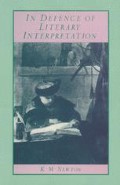Abstract
Great Expectations is a novel that, one feels sure, critics will always be interested in interpreting. The critic’s problem, however, is that there are already in existence more interpretations of it than one can easily read. A new interpreter is likely to feel uneasy at adding to this accumulation of interpretations when he has probably read only a fraction of what has been published on the novel. But, even if a critic makes a great effort and reads through all existing interpretations before working on a new interpretation, he will not be able to retain in his mind and take account of more than a small part of what he has read. And, if the critic decides merely to ignore previous intepretations and concern himself only with his own reading, he is inviting future interpreters to ignore his interpretation also. Critical interpretation is then reduced to a very atomistic or solipsistic activity. The critic, therefore, needs to find a way of engaging with previous interpretations without being swamped by their sheer number.
Access this chapter
Tax calculation will be finalised at checkout
Purchases are for personal use only
Preview
Unable to display preview. Download preview PDF.
Notes
F. R. and Q. D. Leavis, Dickens the Novelist (Harmondsworth, 1972) p. 373. Page numbers from this edition will henceforth be incorporated in the text.
Robert Garis, The Dickens Theatre (Oxford, 1965) p. 206. Page numbers from this edition will henceforth be incorporated in the text.
Quotations and page numbers are from Great Expectations, ed. Angus Calder (Harmondsworth, 1965).
J. Hillis Miller writes in Charles Dickens: The World of his Novels (Bloomington, Ind., and London, 1969) p. 278, ‘The second ending is, in my opinion, the best.’ But, for
Ross H. Dabney in Love and Property in the Novels of Charles Dickens (London, 1967) p. 147, ‘The patched-on second ending is a great mistake, false in substance and tone; the original ending is incomparably better.’
Dennis Walder, in Dickens and Religion (London, 1981) p. 202, detects a religious shift on Dickens’s part in this work, but he sees it as moral rather than metaphysical: ‘If there is a new religious phase in Dickens’s works, then it is revealed in these movements towards mercy, forgiveness and reconciliation.’
Jean-Claude Amalric, ‘Some Reflections on Great Expectations as an Allegory’, in Studies in the Later Dickens, ed. Jean-Claude Amalric (Montpelier, 1973) p. 129.
Harry Stone, Dickens and the Invisible World: Fairy Tale, Fantasy, and Novel Making (London, 1980) p. 305.
See Robin Gilmour, The Idea of the Gentleman in the Victorian Novel (London, 1981) pp. 119ff.
Richard Schacht, Alienation (New York, 1970) pp. 38–9, 39, 52–3.
Julian Moynahan, ‘The Hero’s Guilt: The Case of Great Expectations’, Essays in Criticism, 10 (1960) 65, 68, 77.
Copyright information
© 1986 Kenneth McMillan Newton
About this chapter
Cite this chapter
Newton, K.M. (1986). Conflict and Dialectic in the Interpretation of Great Expectations. In: In Defence of Literary Interpretation. Palgrave Macmillan, London. https://doi.org/10.1007/978-1-349-18447-7_6
Download citation
DOI: https://doi.org/10.1007/978-1-349-18447-7_6
Publisher Name: Palgrave Macmillan, London
Print ISBN: 978-1-349-18449-1
Online ISBN: 978-1-349-18447-7
eBook Packages: Palgrave Literature & Performing Arts CollectionLiterature, Cultural and Media Studies (R0)

